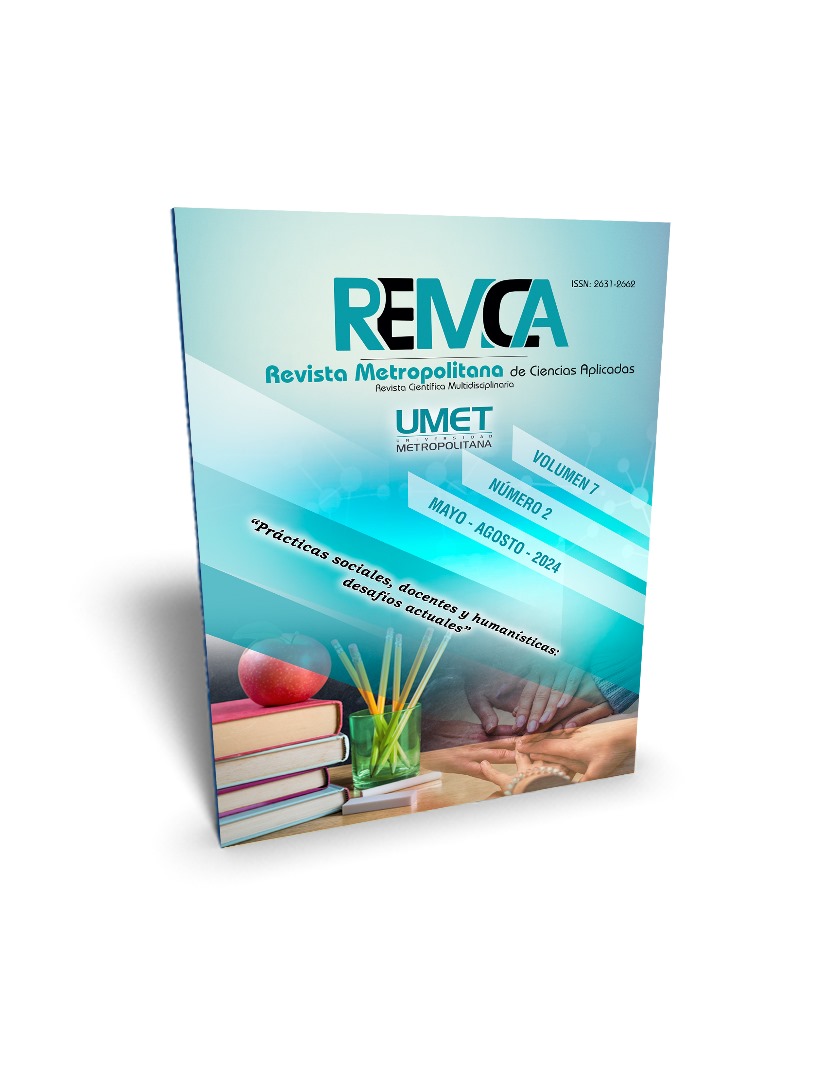Editorial
DOI:
https://doi.org/10.62452/vdf6s665Abstract
Estimados lectores, a continuación les presentamos el segundo número del séptimo volumen de la Revista Metropolitana de Ciencias Aplicadas (REMCA), titulado: “Prácticas sociales, docentes y humanísticas: desafíos actuales”. Esta edición reúne una amplia gama de artículos que analizan, con un enfoque transdisciplinar, temas cruciales para las ciencias sociales, humanísticas, pedagógicas y jurídicas.
En este número se exponen investigaciones relacionadas con los incentivos fiscales; con la ética en la región latinoamericana; aportes sobre la evaluación de riesgos.
En el campo de estudio de la educación son cruciales los temas relacionados con la misión de la universidad actual y los retos que hoy en día se le imponen a los docentes al trabajar con alumnos de alto rendimiento o con aquellos que necesitan atención especial.
Con este número se responde a las principales demandas de la ciencia del Derecho, pues examinamos la novedad del papel del curador; el impacto de las reformas tributarias en las PyMES ecuatorianas; el cumplimiento tributario como herramienta de detección y prevención de riesgos fiscales; el principio de presunción de inocencia, entre otras investigaciones que al leer este número conocerás.
Por consiguiente, el Consejo Editorial espera que, como siempre, este número brinde información meritoria y estimule el debate académico de los profesionales que acostumbran a visitarnos; por lo que les agradecemos a nuestros investigadores por sus contribuciones y a nuestros lectores por su continuo e imprescindible apoyo.
Downloads
Downloads
Published
Issue
Section
License
Copyright (c) 2024 PhD. Yamilka Pino-Sera (Autor/a)

This work is licensed under a Creative Commons Attribution-NonCommercial-ShareAlike 4.0 International License.
Authors who publish in Revista Metropolitana de Ciencias Aplicadas (REMCA), agree to the following terms:
1. Copyright
Authors retain unrestricted copyright to their work. Authors grant the journal the right of first publication. To this end, they assign the journal non-exclusive exploitation rights (reproduction, distribution, public communication, and transformation). Authors may enter into additional agreements for the non-exclusive distribution of the version of the work published in the journal, provided that acknowledgment of its initial publication in this journal is given.
© The authors.
2. License
The articles are published in the journal under the Creative Commons Attribution-NonCommercial-ShareAlike 4.0 International License (CC BY-NC-SA 4.0). The terms can be found at: https://creativecommons.org/licenses/by-nc-sa/4.0/deed.en
This license allows:
- Sharing: Copying and redistributing the material in any medium or format.
- Adapting: Remixing, transforming, and building upon the material.
Under the following terms:
- Attribution: You must give appropriate credit, provide a link to the license, and indicate if any changes were made. You may do this in any reasonable manner, but not in any way that suggests the licensor endorses or sponsors your use.
- NonCommercial: You may not use the material for commercial purposes.
- ShareAlike: If you remix, transform, or build upon the material, you must distribute your creation under the same license as the original work.
There are no additional restrictions. You may not apply legal terms or technological measures that legally restrict others from doing anything the license permits.




